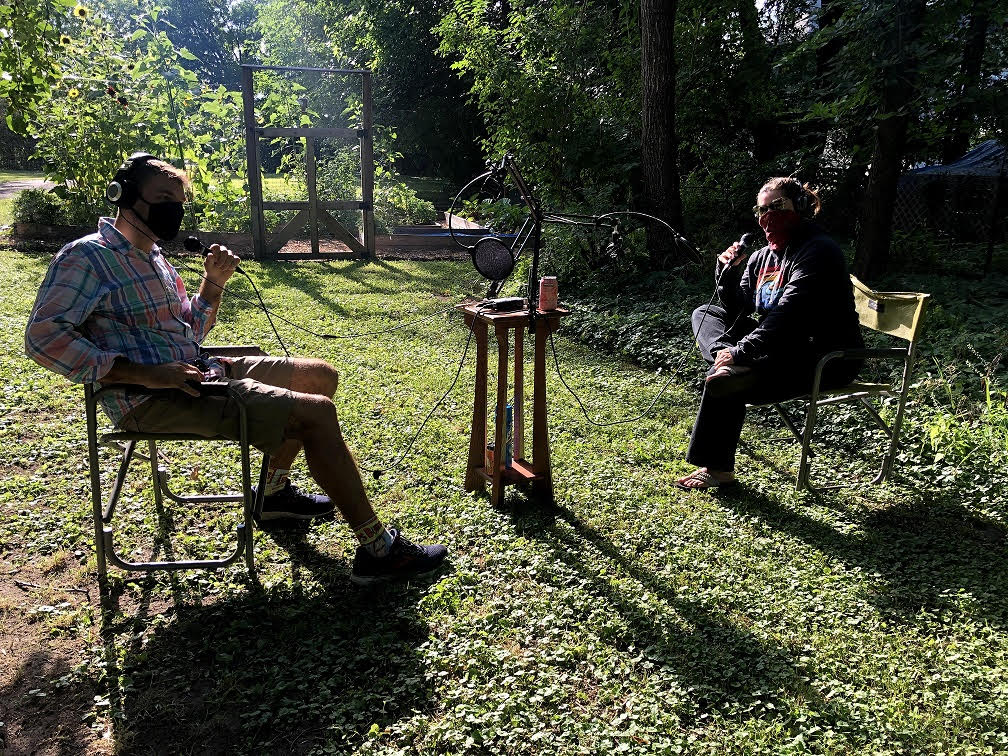Image: Dr. Kaz and her brother George record a podcast episode outside wearing masks due to the pandemic in August 2020. (Courtesy of Dr. Kaz)
A University of Minnesota psychiatrist’s podcast that destigmatizes and promotes understanding of common mental health diagnoses – but took a break in November 2020. Thirty episodes are still available for anyone who needs them.
By Mikayla Scrignoli
Since 2017, Dr. Kaz Nelson and her brother, George Joyer, have released 30 episodes of their podcast “The Mind Deconstructed,” covering a wide variety of mental health conditions – from acute anxiety to borderline personality and bipolar disorders.
Nelson, who goes by “Dr. Kaz” on the podcast, is a psychiatrist and professor at the University of Minnesota Medical School. Joyer, who goes only by “George” on all podcast materials, is a lawyer and former marine.
The podcast seeks to break down the complexities of mental illness diagnoses in a clear, understandable and accessible way, Nelson said.
“It was so important to me that it would be essentially jargon-free, that somebody with even an eighth-grade education level would be able to understand the concepts,” Nelson said. “It’s my job to take complex science and really create frameworks for understanding that leave no one out.”
The idea for “The Mind Deconstructed” was born over dinner one night, when a friend suggested the two make a podcast to destigmatize and explain the mental illness topics that Nelson routinely teaches to her medical students and residents.
“At the beginning, I really just had multiple file folders in my mind, almost scripts,” Nelson said. “Ready-made scripts of content for questions that students commonly ask.”
Joyer stepped up to cover the technical details of recording, editing and distributing the content. “This would have never come to fruition without his willingness to be the technical expert,” Nelson said. “He was willing to support me in that way, truly.”
The episodes on various mental health conditions–including borderline personality disorder, a niche interest Nelson studies within psychiatry–give insight that can increase people’s understanding of diagnoses and, in turn, humanize those conditions.
“So many of the things that people tend to have a bias toward or discriminate against often come from a lack of true understanding,” Nelson said. “This area is kind of ripe for that because the brain and behavior are difficult to understand. It’s a complex subject.”
The goal, she said, is transforming fear into empathy.
“If you can understand the basis of the behavior, you can change from a kind of an automatic or aggressive, fear-based reaction into a much more thoughtful, curious, compassionate, empathic, humanizing perspective,” Nelson said. “And so a little bit of information can completely transform our assumptions about other people, and that is certainly then related to bias and discrimination”
With 40,464 all-time downloads and a 4.9-star rating on Apple Podcasts, “The Mind Deconstructed” garnered lots of positive feedback among listeners. One University of Minnesota Medical resident also designed a potential study that will evaluate the content and how podcasts can serve as types of mental health educational tools.
In the meantime, the podcast is on hiatus as the two reflect on what will come next, Dr. Kaz said. The most recent episode was released in November 2020 and covered the mental health impacts of the pandemic and racial injustice.
Similar to many people throughout the pandemic who are taking time to pause and reflect on different aspects of their lives, Nelson and Joyer are doing the same when it comes to the podcast, she said.
“We want to continue to make an impact but want to think about what that looks like before just jumping in,” Nelson said.
It’s unclear when new content will be released. In the meantime, the 30 available episodes explain many different mental health conditions and can be a starting point for anyone looking to learn more.
“That’s been very exciting for me that this podcast can offer people that foundational learning and they can take that and run with it,” Nelson said. “That was the dream. To have something [from which] people can learn something and enjoy the process.”
